【BBC六分钟英语】骑士精神死了吗?
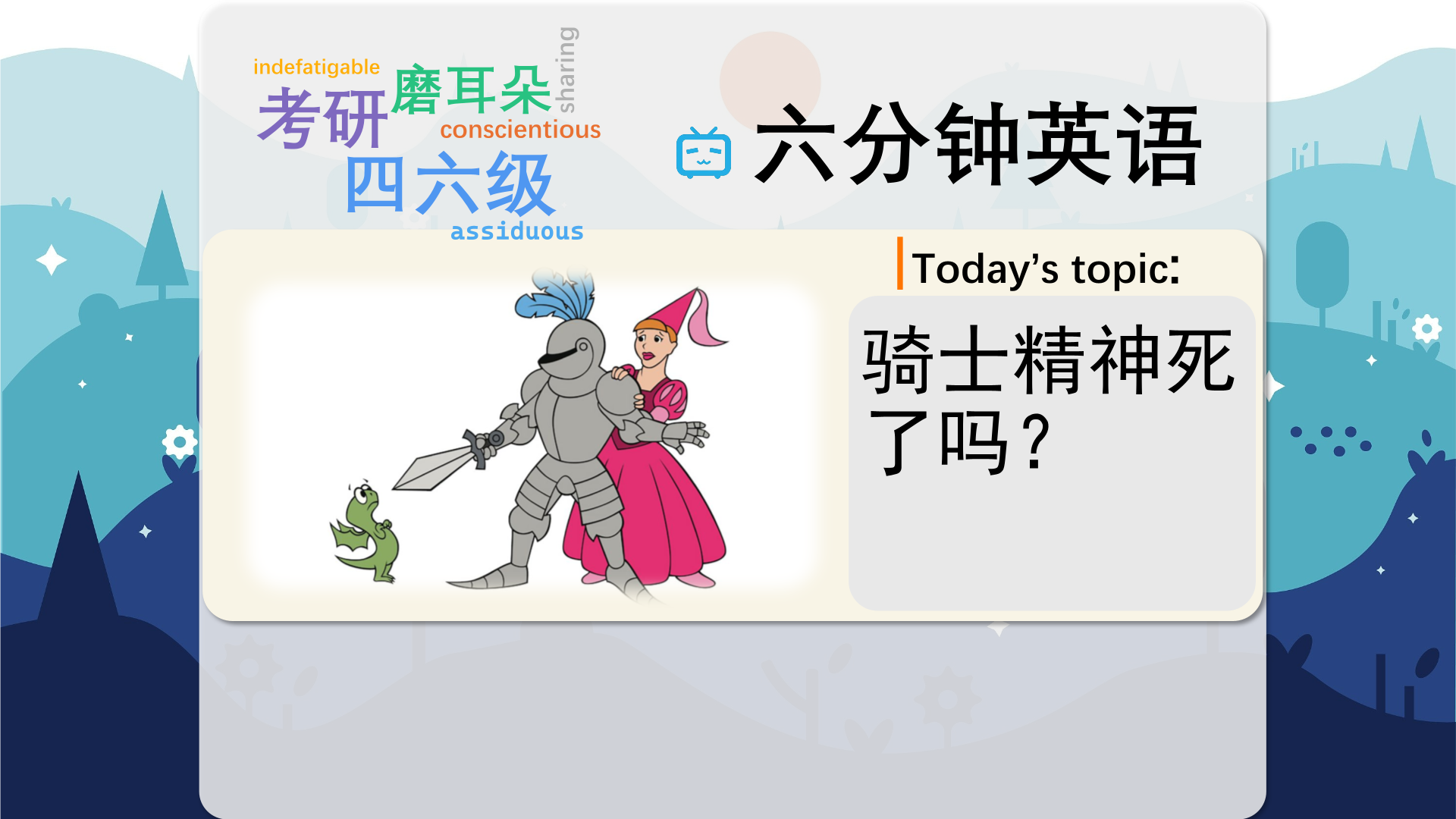
【英文脚本】
Neil
Hello and welcome to 6 Minute English. I’m Neil…
Alice
… And I’m Alice. My chair feels [audibly shifts about in her chair] uncomfortable today. How does yours feel?
Neil
Um… mine is fine - very comfortable, thank you.
Alice
Well, it would be nice if you offered to give me your chair, Neil.
Neil
What? No chance. Well, I would be uncomfortable then, wouldn’t I?
Alice
You should give me your seat, Neil.
Neil
Should I? Well, now might be a good time to mention that chivalry is the subject of today’s show.
Alice
Chivalry these days means polite behaviour usually by men towards women.
Neil
Though in the past it referred to a code of behaviour followed by knights in the Middle Ages. It was all about honour and courage in battle, and only later on about being polite to the ladies. Well, we aren’t living in the Middle Ages any more, are we?
Alice
No comment. Let’s go for our traditional question. I have a literary one for you today: Who wrote the novel Don Quixote, about a 50-year old man travelling Spain in search of knightly adventures in rusty armour and a cardboard helmet? Was it… a) Miguel de Cervantes b) Leo Tolstoy Or c) William Shakespeare?
Neil
I think - I’m going to get it right today, Alice, I’m going to say a) Miguel de Cervantes.
Alice
Well, we’ll find out later on in the show if you were right or not. But first, do you think chivalry is dead, Neil?
Neil
No, not at all, these traditions are alive and kicking, in Poland at any rate. If something is alive and kicking it means it’s active. The BBC reporter Adam Easton saw it with his own eyes and is going to describe it for us.
Adam Easton, BBC reporter
Medieval knights’ tournaments or battle re-enactments are popular across Europe. But there’s something about dressing up as a knight that particularly appeals to people here in Poland. In the summer there’s events every weekend and here in Malbork Northern Poland home to Europe’s largest medieval castle there’s one of the biggest of the season. There’s archery, crossbow, jousting, other horse skills, and more than a hundred thousand people come to watch these tournaments.
Alice
The BBC reporter Adam Easton. By the way, what’s a re-enactment, Neil?
Neil
It’s where you perform the actions of a past event. And in Malbork in Poland they stage battle re-enactments every weekend apparently, at least in the summer months!
Alice
Mmm… it doesn’t sound like my cup of tea, and that means it doesn’t sound like something I would enjoy doing, how about you, Neil?
Neil
Well, I’m not sure about the archery, crossbow and jousting. It all sounds like too much hard work. But I’d definitely enjoy the dressing up.
Alice
Excellent! Well, jousting is where two people fight on horseback using a lance, or long pole, to try to knock the other person off their horse, especially as part of a tournament – or sporting event. So with the dressing up, Neil, I’m curious. I can’t imagine you as a knight in shining armour, to be honest…
Neil
Come on, Alice. I’d look very appealing to any damsel in distress. A damsel in distress is a young unmarried woman in need of help.
Alice
OK. You might make a very fetching, or attractive, knight, Neil. But you should get used to actually helping the ladies … maybe offering me your seat. I’m still sitting uncomfortably here…
Neil
Come on, Alice, a knight needs to sit comfortably too. We’ve always been the ones with battles to fight!
Alice
But at some point in the history of chivalry, prowess, or skill, on the battlefield became combined with a set of conventions, or rules, governing other aspects of behaviour. This included a knight’s moral and religious duties and how to conduct their love affairs. Professor Laura Ashe at Oxford University explains.
Laura Ashe, Associate Professor in English at the University of Oxford, UK
The really strange thing is the idea that love should somehow make you a better knight. I mean, this is what is suddenly claimed in the late 12th century and it makes very little sense, you know, if you imagine a footballer telling his teammates that being in love makes him a better footballer.
Neil
That was Professor Laura Ashe. And I agree with her. What has being a great footballer or a great warrior got to do with love?
Alice
Well, courtly love was a social code governing behaviour between aristocratic men and women that developed at the same time and amongst the same people as chivalry and the two became intertwined, or hard to separate, from then on.
Neil
And aristocrats are people of high social rank. OK Alice, I think it’s time you told us the answer to today’s quiz question.
Alice
Good idea. OK. I asked: Who wrote the novel Don Quixote, about a 50-year old man travelling Spain in search of knightly adventures in rusty armour and a cardboard helmet? Was it… a) Miguel de Cervantes, b) Leo Tolstoy or c) William Shakespeare?
Neil
And I said a) Miguel de Cervantes.
Alice
And you were right! Well done! Don Quixote was written by Miguel de Cervantes and published in 1605. It’s a comic novel which describes what happens to an elderly knight who, his head muddled by reading too many romances, sets out on his old horse with his companion Sancho Panza, to seek adventure.
Neil
Very interesting, Alice. Now can we hear the words we learned today?
Alice
Sure, they are: chivalry alive and kicking re-enactment my cup of tea jousting lance tournament fetching damsel in distress prowess conventions courtly love intertwined aristocrats
Neil
Well, that’s the end of today’s 6 Minute English. Please join us again soon. And… by the way, Alice, would you like my chair? It’s very comfortable…
Alice
Oh, thank you - now that the programme is over, Neil!
Neil
Better late than never.
Both
Bye.
【中英文双语脚本】
Neil(尼尔)
Hello and welcome to 6 Minute English. I’m Neil…
您好,欢迎来到 6 Minute English。我是 Neil…
Alice(爱丽丝)
… And I’m Alice. My chair feels [audibly shifts about in her chair] uncomfortable today. How does yours feel?
…我是 Alice。我的椅子今天感觉 [在她的椅子上听见移动] 不舒服。你的感觉如何?
Neil(尼尔)
Um… mine is fine - very comfortable, thank you.
嗯……我的很好 - 非常舒适,谢谢。
Alice(爱丽丝)
Well, it would be nice if you offered to give me your chair, Neil.
好吧,如果你愿意把你的椅子给我,那就太好了,Neil。
Neil(尼尔)
What? No chance. Well, I would be uncomfortable then, wouldn’t I?
什么?没有机会。好吧,那我会不舒服,不是吗?
Alice(爱丽丝)
You should give me your seat, Neil.
你应该把你的座位给我,尼尔。
Neil(尼尔)
Should I? Well, now might be a good time to mention that chivalry is the subject of today’s show.
我应该吗?好吧,现在可能是提到骑士精神是今天节目主题的好时机。
Alice(爱丽丝)
Chivalry these days means polite behaviour usually by men towards women.
如今的骑士精神意味着通常由男性对女性做出的礼貌行为。
Neil(尼尔)
Though in the past it referred to a code of behaviour followed by knights in the Middle Ages. It was all about honour and courage in battle, and only later on about being polite to the ladies. Well, we aren’t living in the Middle Ages any more, are we?
尽管在过去它指的是中世纪骑士遵循的行为准则。这完全是关于战斗中的荣誉和勇气,后来才是关于对女士们的礼貌。好吧,我们不再生活在中世纪了,不是吗?
Alice(爱丽丝)
No comment. Let’s go for our traditional question. I have a literary one for you today: Who wrote the novel Don Quixote, about a 50-year old man travelling Spain in search of knightly adventures in rusty armour and a cardboard helmet? Was it… a) Miguel de Cervantes b) Leo Tolstoy Or c) William Shakespeare?
不加评论。让我们来回答我们的传统问题。今天我有一本文学作品要告诉你:谁写了小说《堂吉诃德》,讲述了一个 50 岁的男人穿着生锈的盔甲和纸板头盔在西班牙旅行,寻找骑士般的冒险的故事?是不是……a) 米格尔·德·塞万提斯 b) 列夫·托尔斯泰 或 c) 威廉·莎士比亚?
Neil(尼尔)
I think - I’m going to get it right today, Alice, I’m going to say a) Miguel de Cervantes.
我想 - 我今天要把事情说对,Alice,我要说 a) 米格尔·德·塞万提斯。
Alice(爱丽丝)
Well, we’ll find out later on in the show if you were right or not. But first, do you think chivalry is dead, Neil?
好吧,我们稍后会在节目中发现你是对还是错。但首先,你认为骑士精神已经死了吗,尼尔?
Neil(尼尔)
No, not at all, these traditions are alive and kicking, in Poland at any rate. If something is alive and kicking it means it’s active. The BBC reporter Adam Easton saw it with his own eyes and is going to describe it for us.
不,一点也不,这些传统无论如何在波兰是活生生的。如果某物是活的并且踢它意味着它是活跃的。BBC 记者亚当·伊斯顿 (Adam Easton) 亲眼目睹了它,并将为我们描述它。
Adam Easton, BBC reporter(AdamEaston,BBC记者)
Medieval knights’ tournaments or battle re-enactments are popular across Europe. But there’s something about dressing up as a knight that particularly appeals to people here in Poland. In the summer there’s events every weekend and here in Malbork Northern Poland home to Europe’s largest medieval castle there’s one of the biggest of the season. There’s archery, crossbow, jousting, other horse skills, and more than a hundred thousand people come to watch these tournaments.
中世纪骑士比赛或战斗重演在欧洲很受欢迎。但是,打扮成骑士有一些东西特别吸引波兰人。夏季,每个周末都有活动,在欧洲最大的中世纪城堡所在地波兰北部的马尔堡,有当季最大的活动之一。有射箭、弩、比武、其他马术,有超过十万人前来观看这些比赛。
Alice(爱丽丝)
The BBC reporter Adam Easton. By the way, what’s a re-enactment, Neil?
BBC 记者亚当·伊斯顿。顺便说一句,什么是重演,尼尔?
Neil(尼尔)
It’s where you perform the actions of a past event. And in Malbork in Poland they stage battle re-enactments every weekend apparently, at least in the summer months!
这是您执行过去事件作的地方。在波兰的马尔堡,他们显然每个周末都会上演战斗重演,至少在夏季是这样!
Alice(爱丽丝)
Mmm… it doesn’t sound like my cup of tea, and that means it doesn’t sound like something I would enjoy doing, how about you, Neil?
嗯。。。这听起来不像我的那杯茶,这意味着它听起来不像我喜欢做的事情,你呢,尼尔?
Neil(尼尔)
Well, I’m not sure about the archery, crossbow and jousting. It all sounds like too much hard work. But I’d definitely enjoy the dressing up.
嗯,我对射箭、弩和比武不确定。这听起来像是太多的辛苦工作。但我肯定会喜欢这种打扮。
Alice(爱丽丝)
Excellent! Well, jousting is where two people fight on horseback using a lance, or long pole, to try to knock the other person off their horse, especially as part of a tournament – or sporting event. So with the dressing up, Neil, I’m curious. I can’t imagine you as a knight in shining armour, to be honest…
非常好!嗯,比武是两个人在马背上使用长矛或长杆战斗,试图将另一个人从马背上击落,尤其是作为比赛或体育赛事的一部分。所以关于打扮,Neil,我很好奇。老实说,我无法想象你是一个穿着闪亮盔甲的骑士……
Neil(尼尔)
Come on, Alice. I’d look very appealing to any damsel in distress. A damsel in distress is a young unmarried woman in need of help.
来吧,爱丽丝。我对任何遇险的少女都非常有吸引力。遇险少女是指需要帮助的年轻未婚女性。
Alice(爱丽丝)
OK. You might make a very fetching, or attractive, knight, Neil. But you should get used to actually helping the ladies … maybe offering me your seat. I’m still sitting uncomfortably here…
还行。你可能会成为一个非常吸引人或有吸引力的骑士,尼尔。但你应该习惯于真正帮助女士们……也许把你的座位给我。我仍然坐在这里不舒服……
Neil(尼尔)
Come on, Alice, a knight needs to sit comfortably too. We’ve always been the ones with battles to fight!
来吧,爱丽丝,骑士也需要坐得舒服。我们一直是有战斗要打的人!
Alice(爱丽丝)
But at some point in the history of chivalry, prowess, or skill, on the battlefield became combined with a set of conventions, or rules, governing other aspects of behaviour. This included a knight’s moral and religious duties and how to conduct their love affairs. Professor Laura Ashe at Oxford University explains.
但在骑士精神历史的某个时刻,战场上的英勇或技能与一套管理行为其他方面的惯例或规则相结合。这包括骑士的道德和宗教义务以及如何进行他们的爱情活动。牛津大学的 Laura Ashe 教授解释道。
Laura Ashe, Associate Professor in English at the University of Oxford, UK(LauraAshe,英国牛津大学英语副教授)
The really strange thing is the idea that love should somehow make you a better knight. I mean, this is what is suddenly claimed in the late 12th century and it makes very little sense, you know, if you imagine a footballer telling his teammates that being in love makes him a better footballer.
真正奇怪的是,爱应该以某种方式让你成为更好的骑士。我的意思是,这是 12 世纪后期突然声称的,如果你想象一个足球运动员告诉他的队友,恋爱会让他成为一个更好的足球运动员,那么它就没有什么意义了。
Neil(尼尔)
That was Professor Laura Ashe. And I agree with her. What has being a great footballer or a great warrior got to do with love?
那是 Laura Ashe 教授。我同意她的看法。成为一名伟大的足球运动员或伟大的战士与爱有什么关系?
Alice(爱丽丝)
Well, courtly love was a social code governing behaviour between aristocratic men and women that developed at the same time and amongst the same people as chivalry and the two became intertwined, or hard to separate, from then on.
嗯,宫廷之爱是管理贵族男女之间行为的社会准则,它与骑士精神同时在同一时间在同一人群中发展起来,从那时起,两者就交织在一起,或者说难以分离。
Neil(尼尔)
And aristocrats are people of high social rank. OK Alice, I think it’s time you told us the answer to today’s quiz question.
贵族是社会地位较高的人。好的,Alice,我想你该告诉我们今天测验问题的答案了。
Alice(爱丽丝)
Good idea. OK. I asked: Who wrote the novel Don Quixote, about a 50-year old man travelling Spain in search of knightly adventures in rusty armour and a cardboard helmet? Was it… a) Miguel de Cervantes, b) Leo Tolstoy or c) William Shakespeare?
好主意。还行。我问:谁写了小说《堂吉诃德》(Don Quixote),小说讲述了一个 50 岁的男人穿着生锈的盔甲和纸板头盔在西班牙旅行,寻找骑士般的冒险?是不是……a) 米格尔·德·塞万提斯,b) 列夫·托尔斯泰还是 c) 威廉·莎士比亚?
Neil(尼尔)
And I said a) Miguel de Cervantes.
我说 a) 米格尔·德·塞万提斯。
Alice(爱丽丝)
And you were right! Well done! Don Quixote was written by Miguel de Cervantes and published in 1605. It’s a comic novel which describes what happens to an elderly knight who, his head muddled by reading too many romances, sets out on his old horse with his companion Sancho Panza, to seek adventure.
你是对的!干的好!《堂吉诃德》由米格尔·德·塞万提斯 (Miguel de Cervantes) 撰写,于 1605 年出版。这是一部漫画小说,描述了一位老骑士的遭遇,他因阅读了太多的浪漫故事而头脑混乱,与他的同伴桑丘·潘萨 (Sancho Panza) 一起骑着他的老马出发去寻求冒险。
Neil(尼尔)
Very interesting, Alice. Now can we hear the words we learned today?
非常有趣,爱丽丝。现在我们能听到今天学到的话语吗?
Alice(爱丽丝)
Sure, they are: chivalry alive and kicking re-enactment my cup of tea jousting lance tournament fetching damsel in distress prowess conventions courtly love intertwined aristocrats
当然,他们是: 骑士精神 活着 踢球 重演 我的一杯茶 比武 长枪比赛 抓住遇险少女 英技勇 惯例 宫廷爱情 交织在一起的贵族
Neil(尼尔)
Well, that’s the end of today’s 6 Minute English. Please join us again soon. And… by the way, Alice, would you like my chair? It’s very comfortable…
好了,今天的六分钟 English 到此结束。请尽快再次加入我们。和。。。对了,爱丽丝,你要我的椅子吗?很舒服…
Alice(爱丽丝)
Oh, thank you - now that the programme is over, Neil!
哦,谢谢你 - 现在节目已经结束了,尼尔!
Neil(尼尔)
Better late than never.
迟到总比不到好。
Both(双)
Bye.
再见。

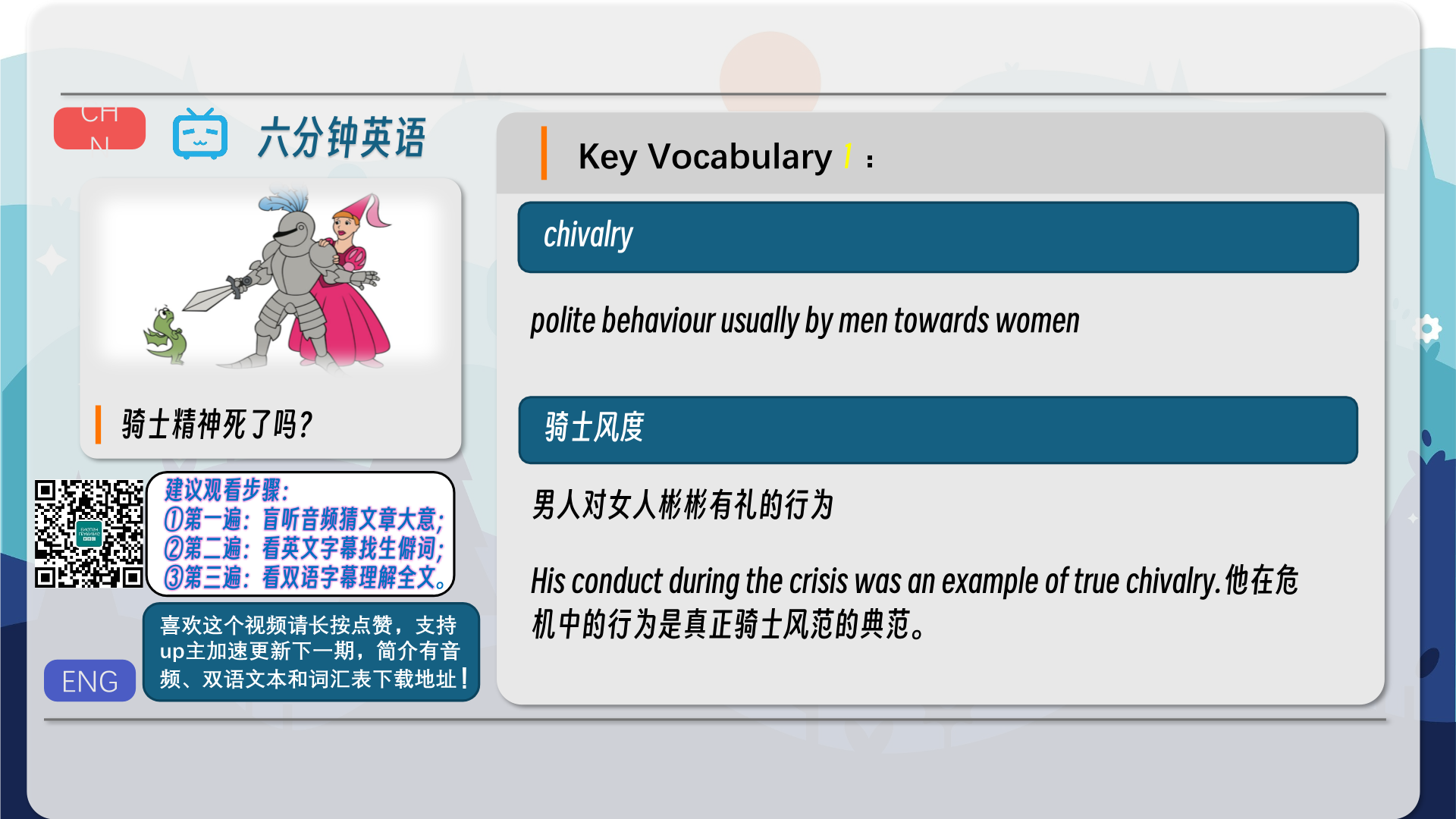
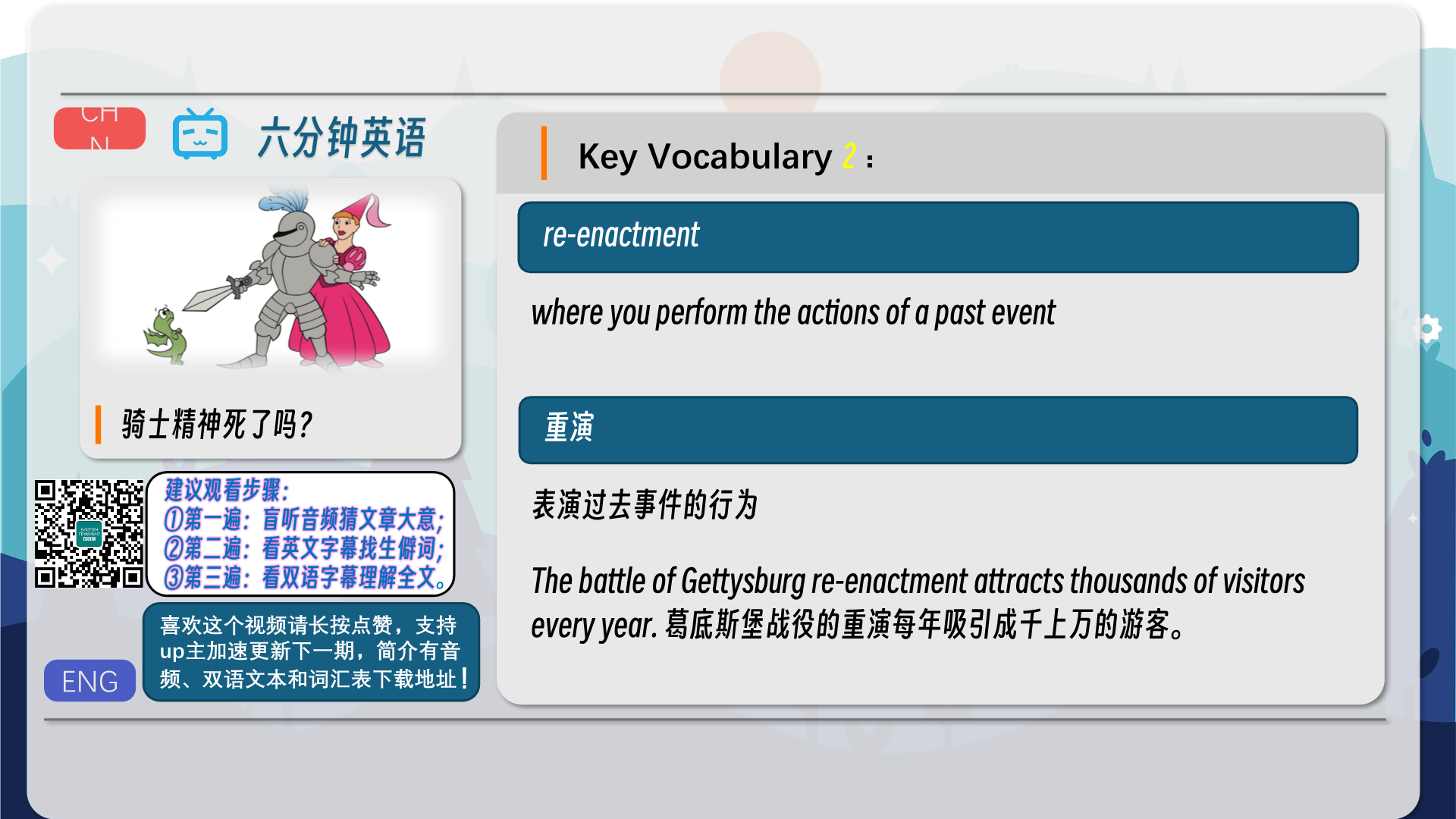
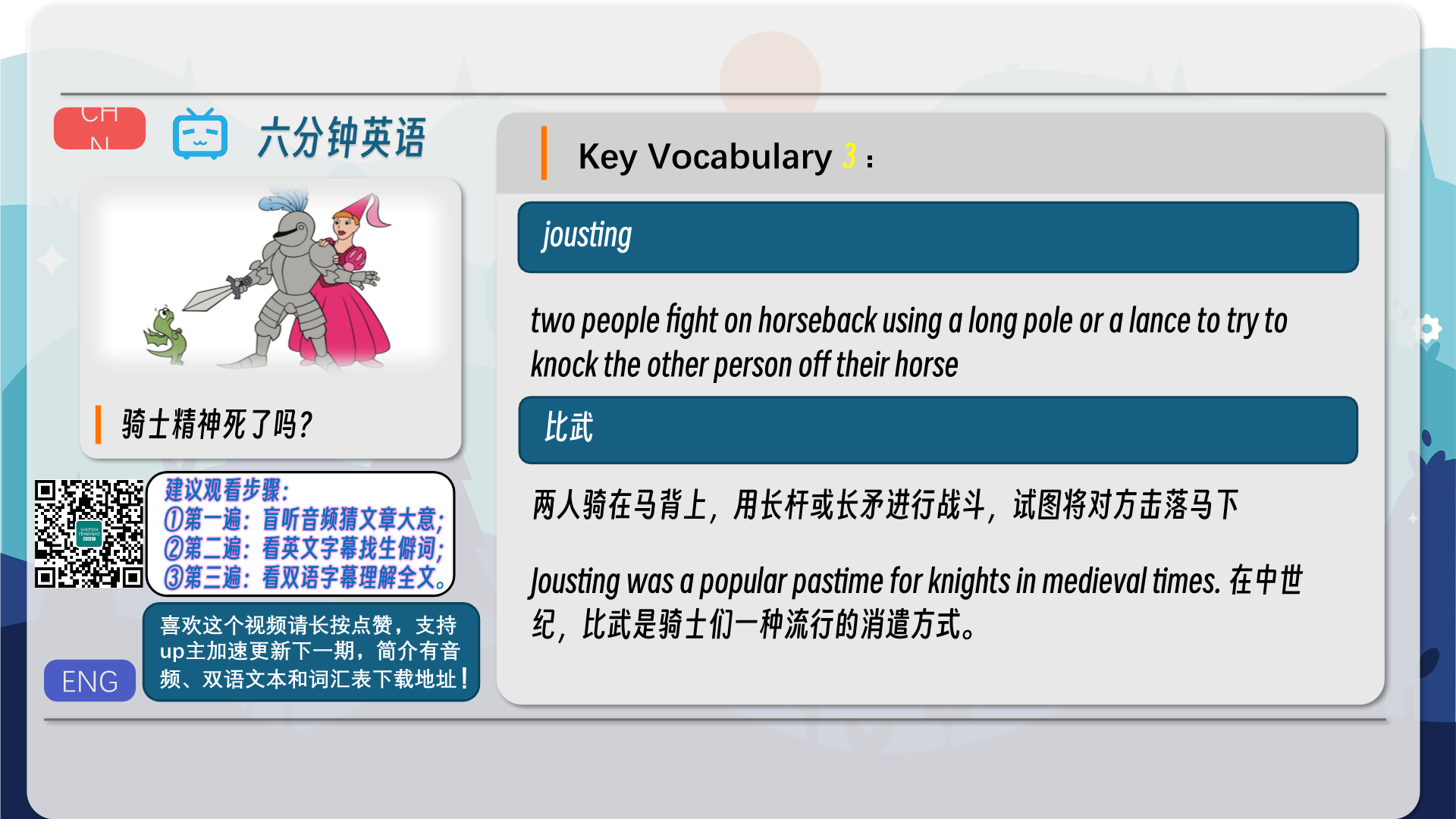
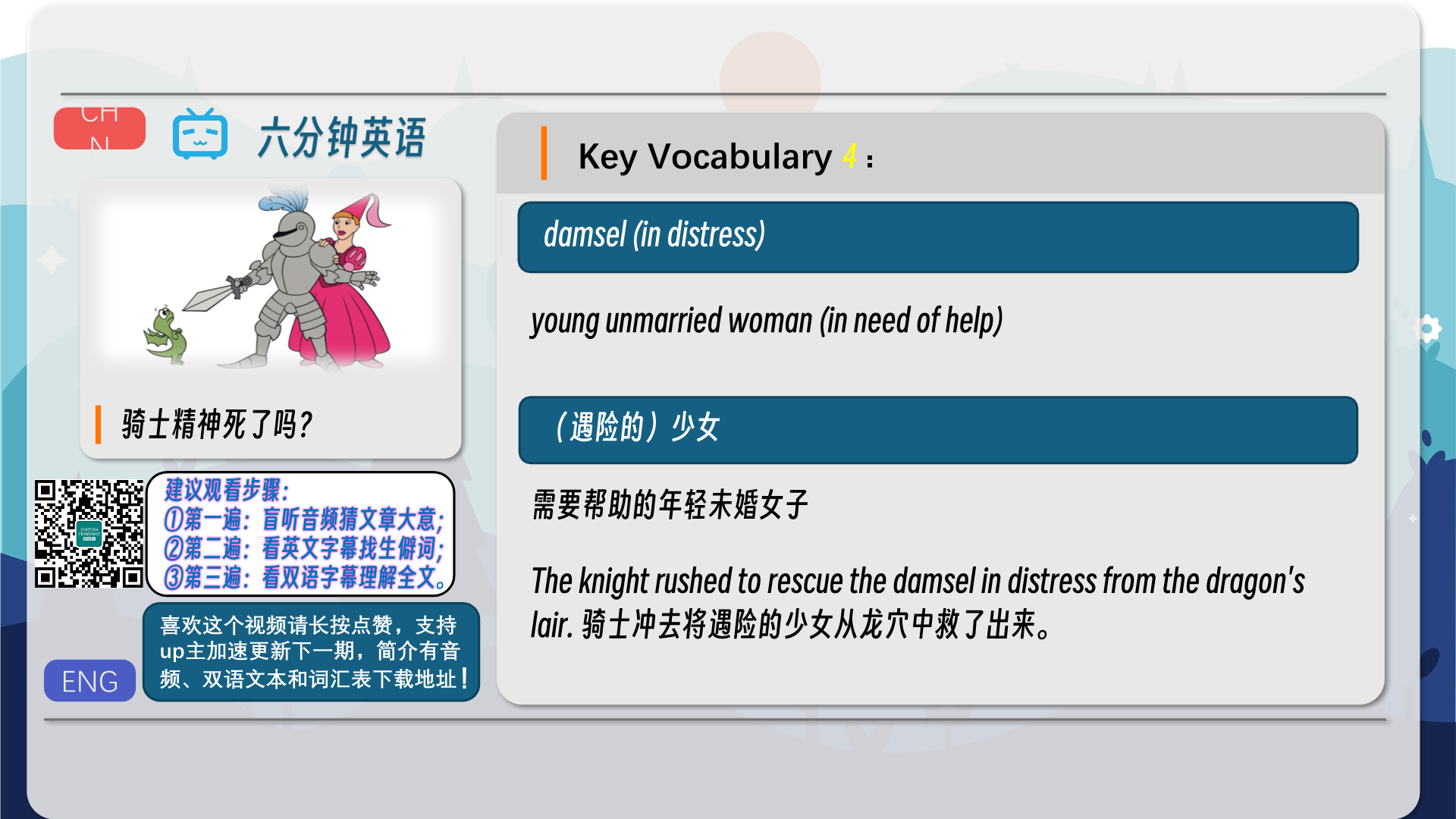
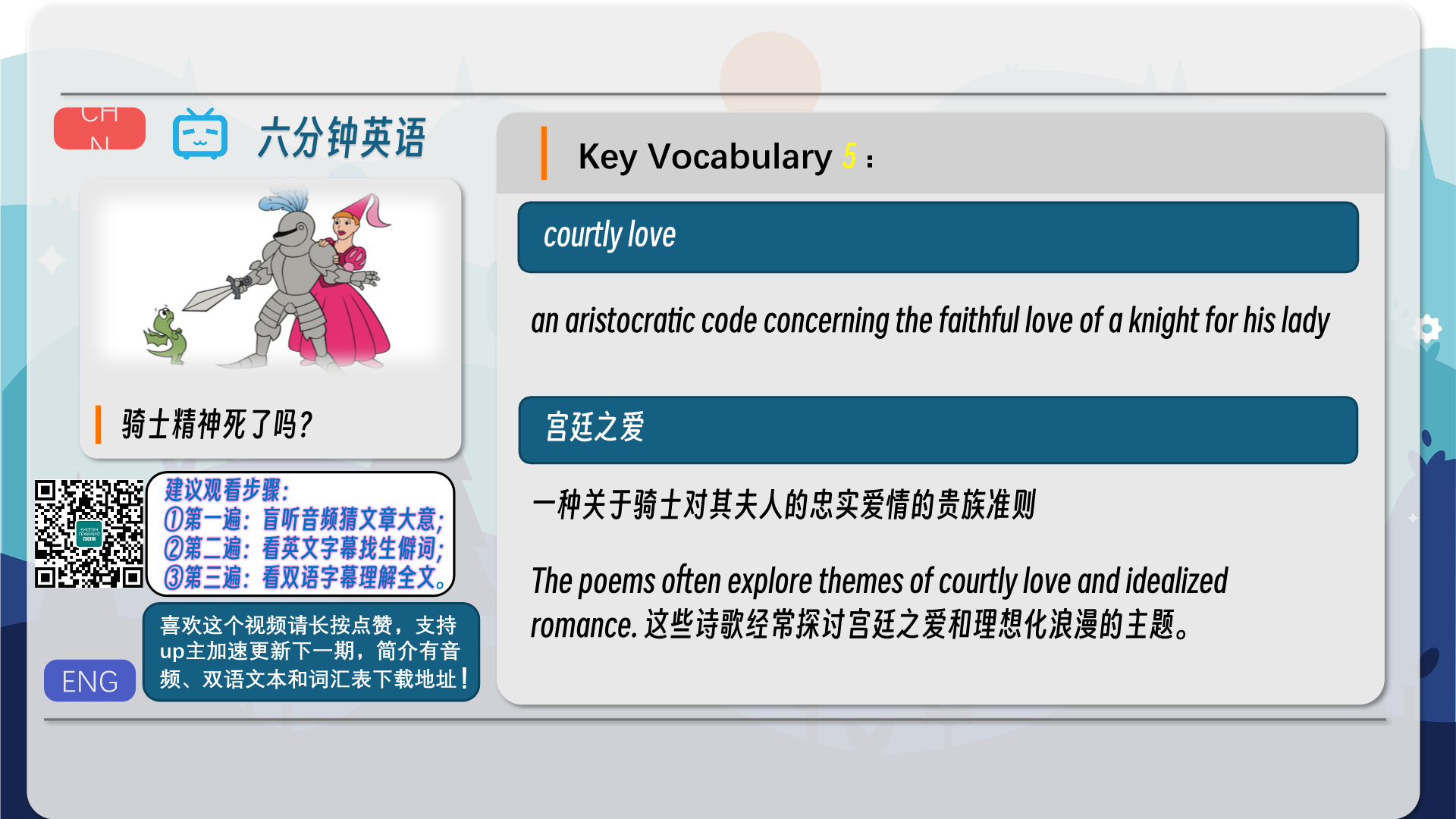
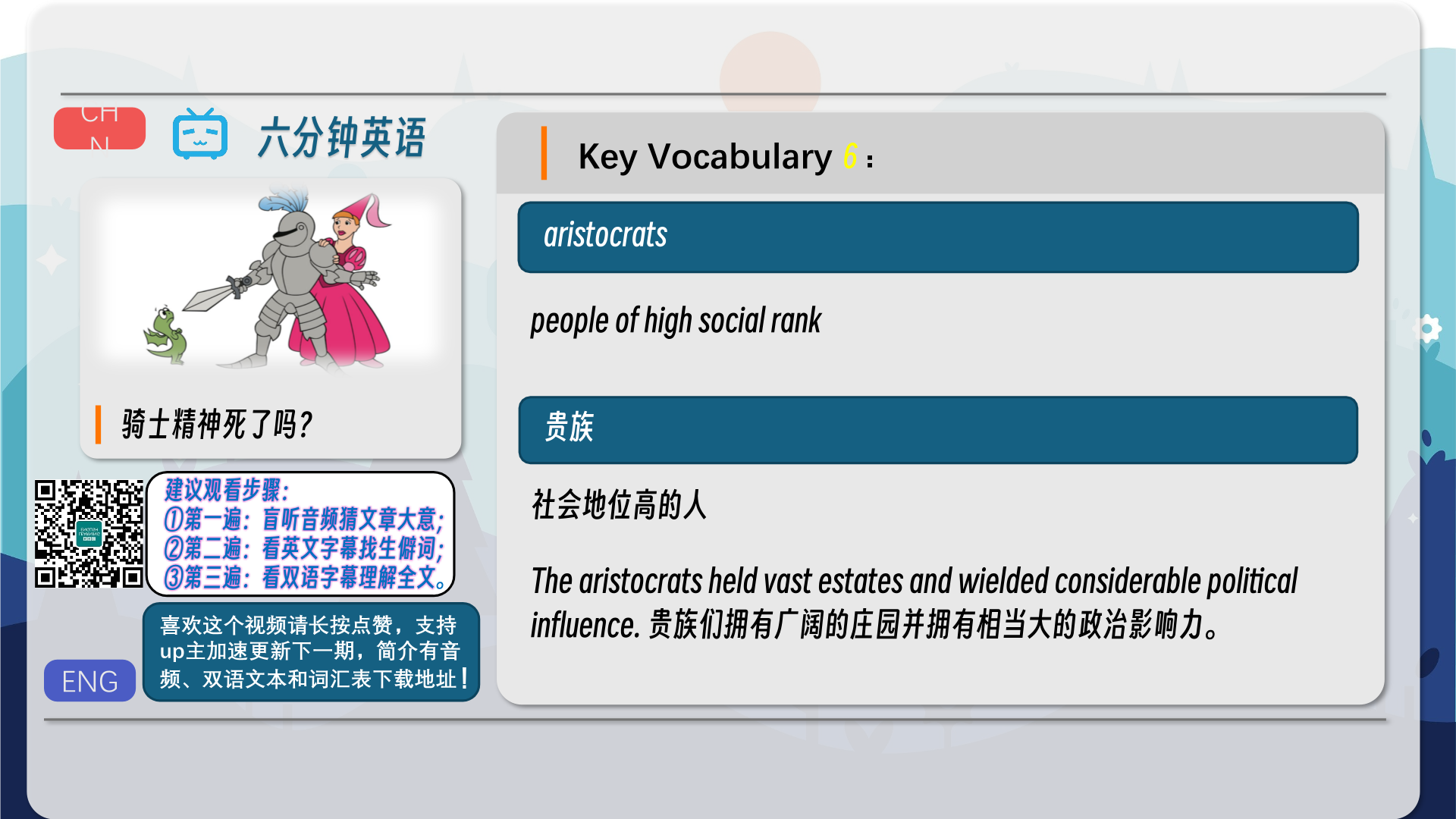
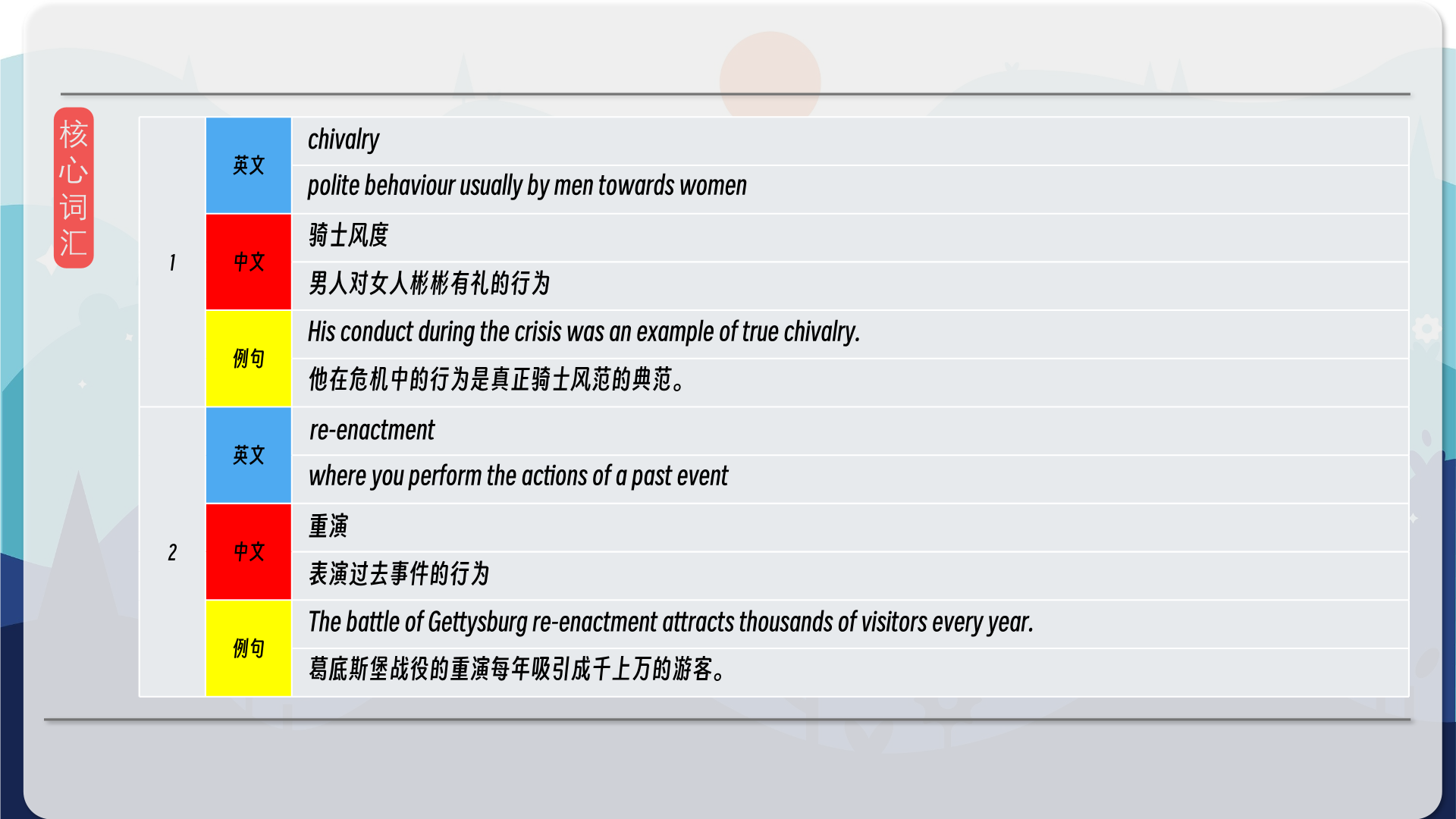
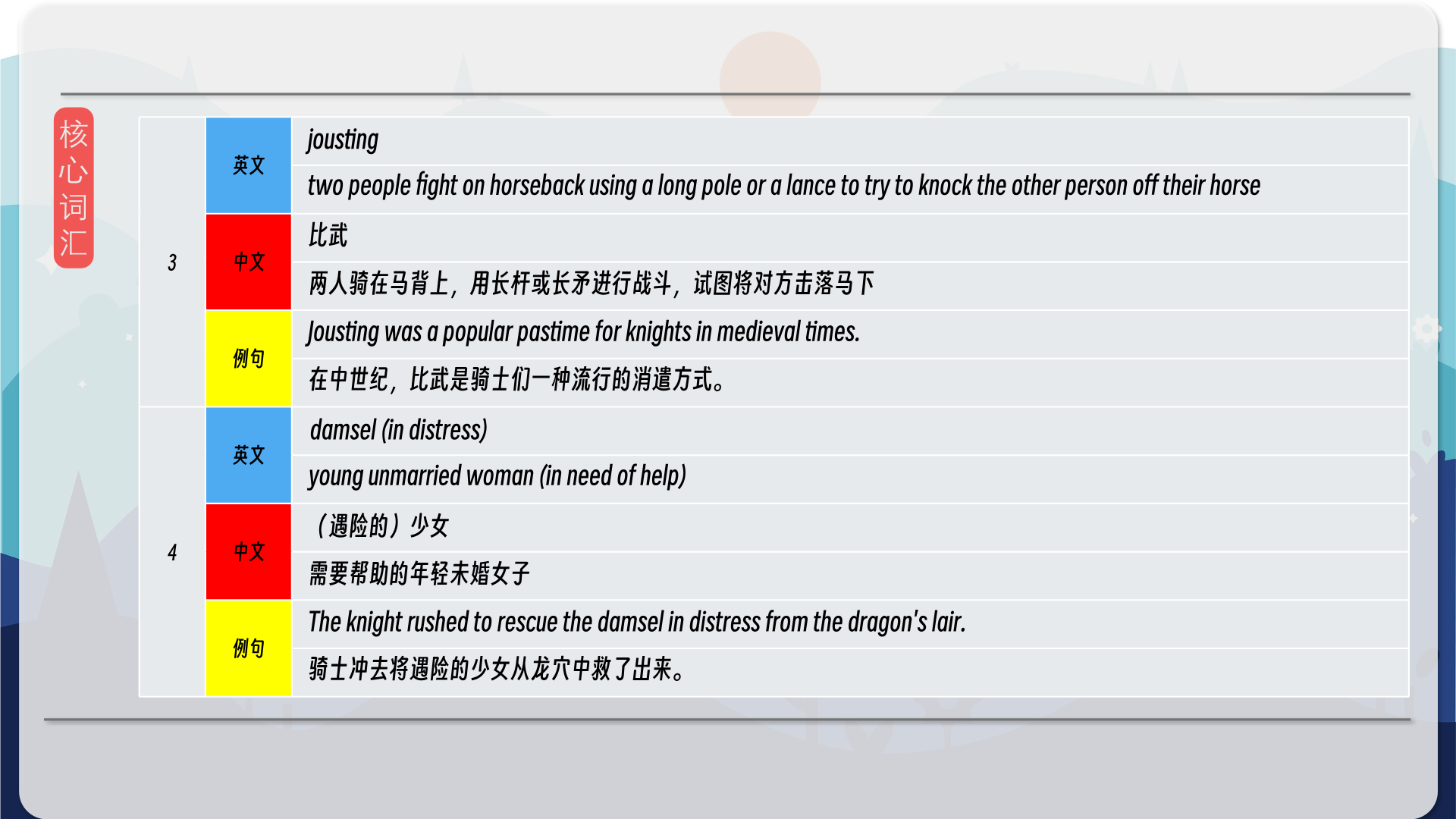
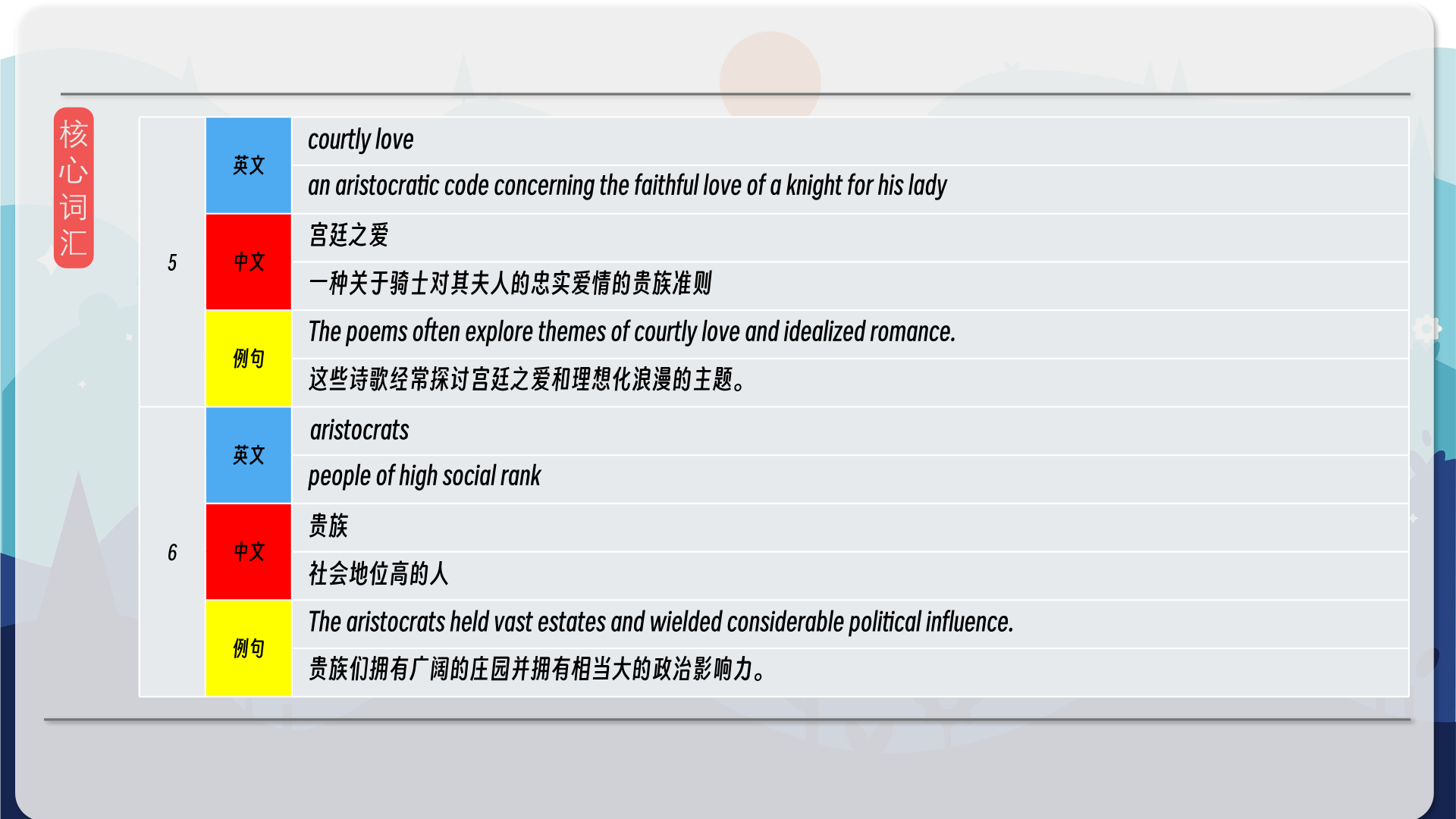
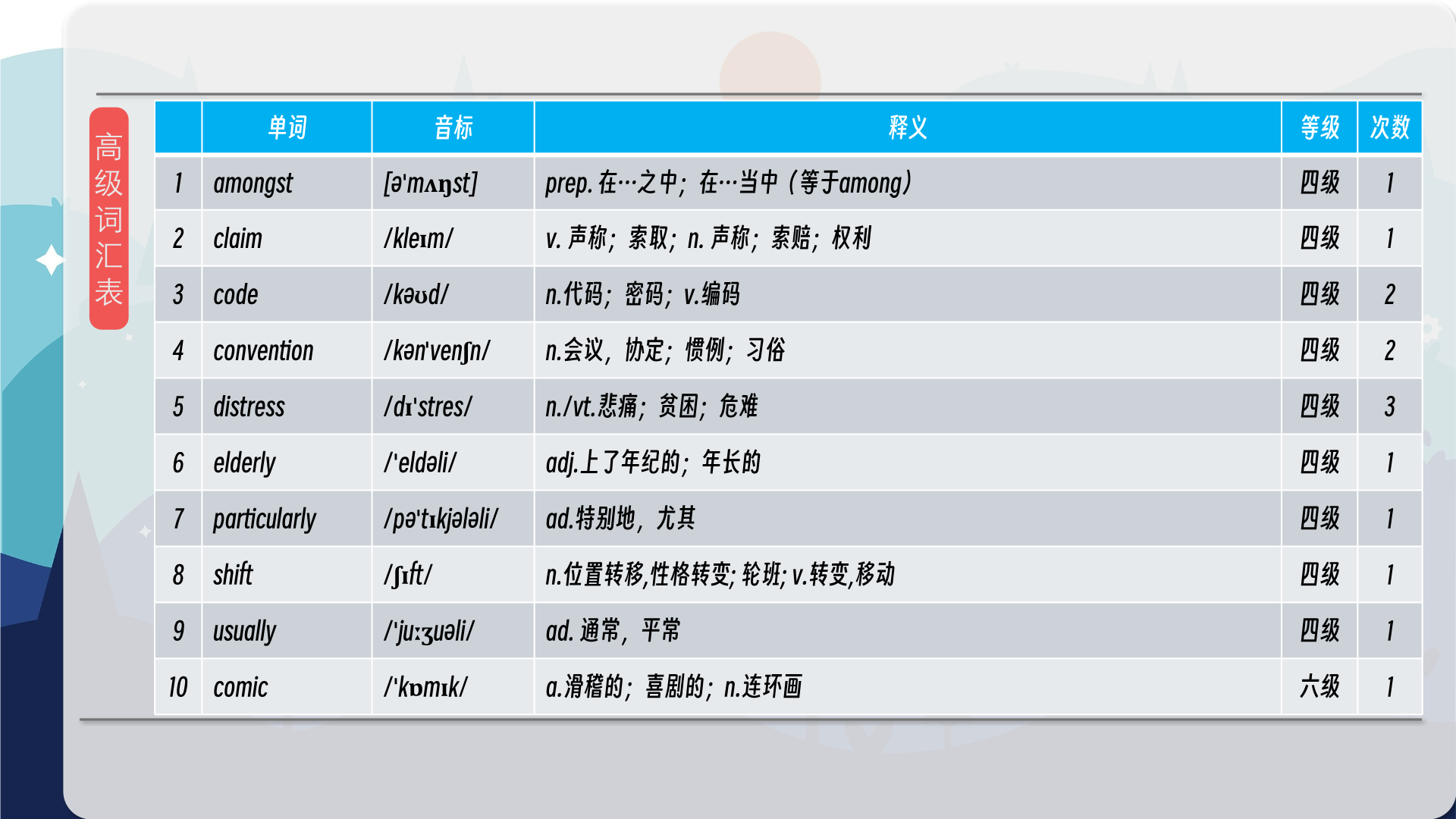
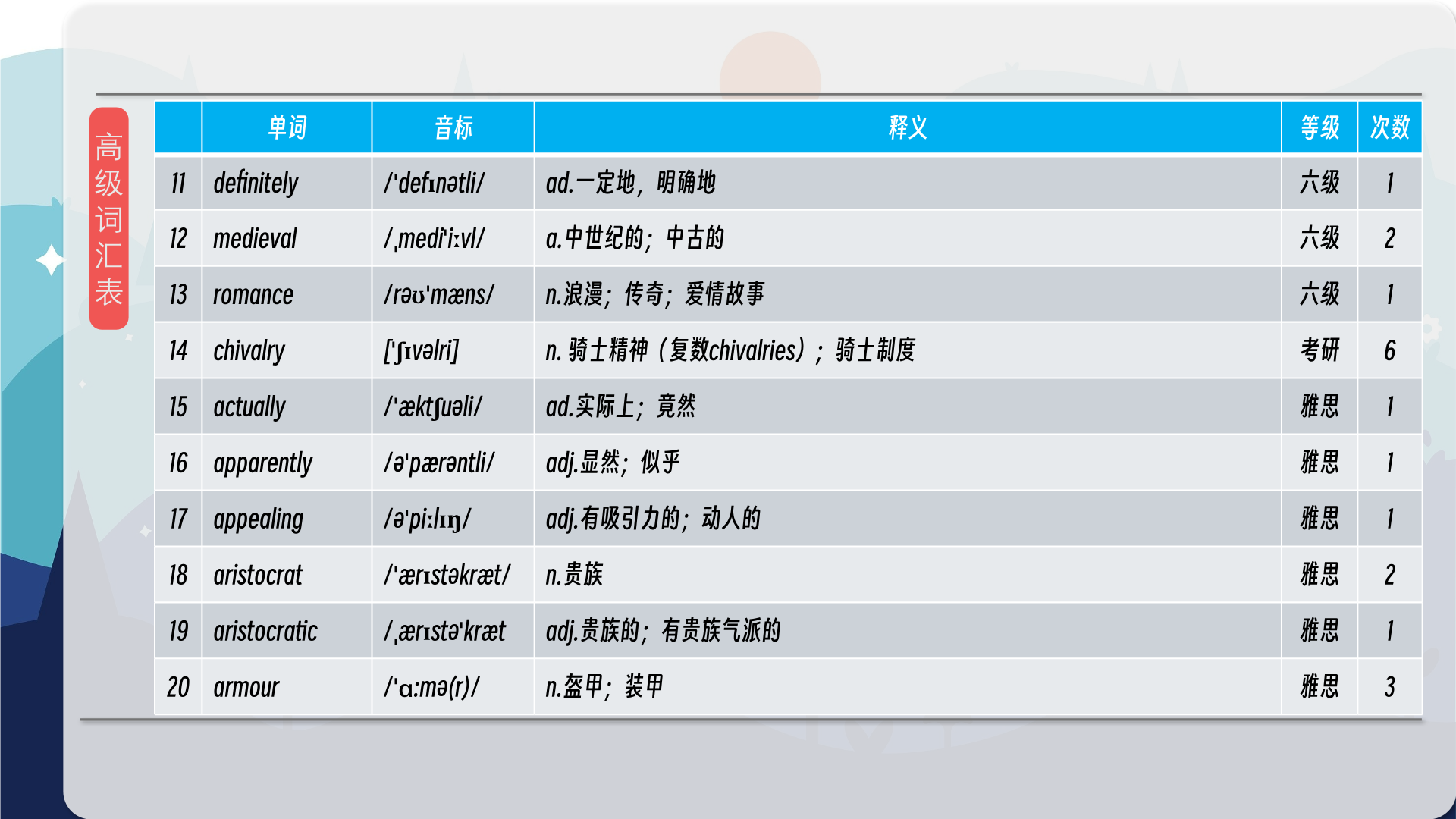
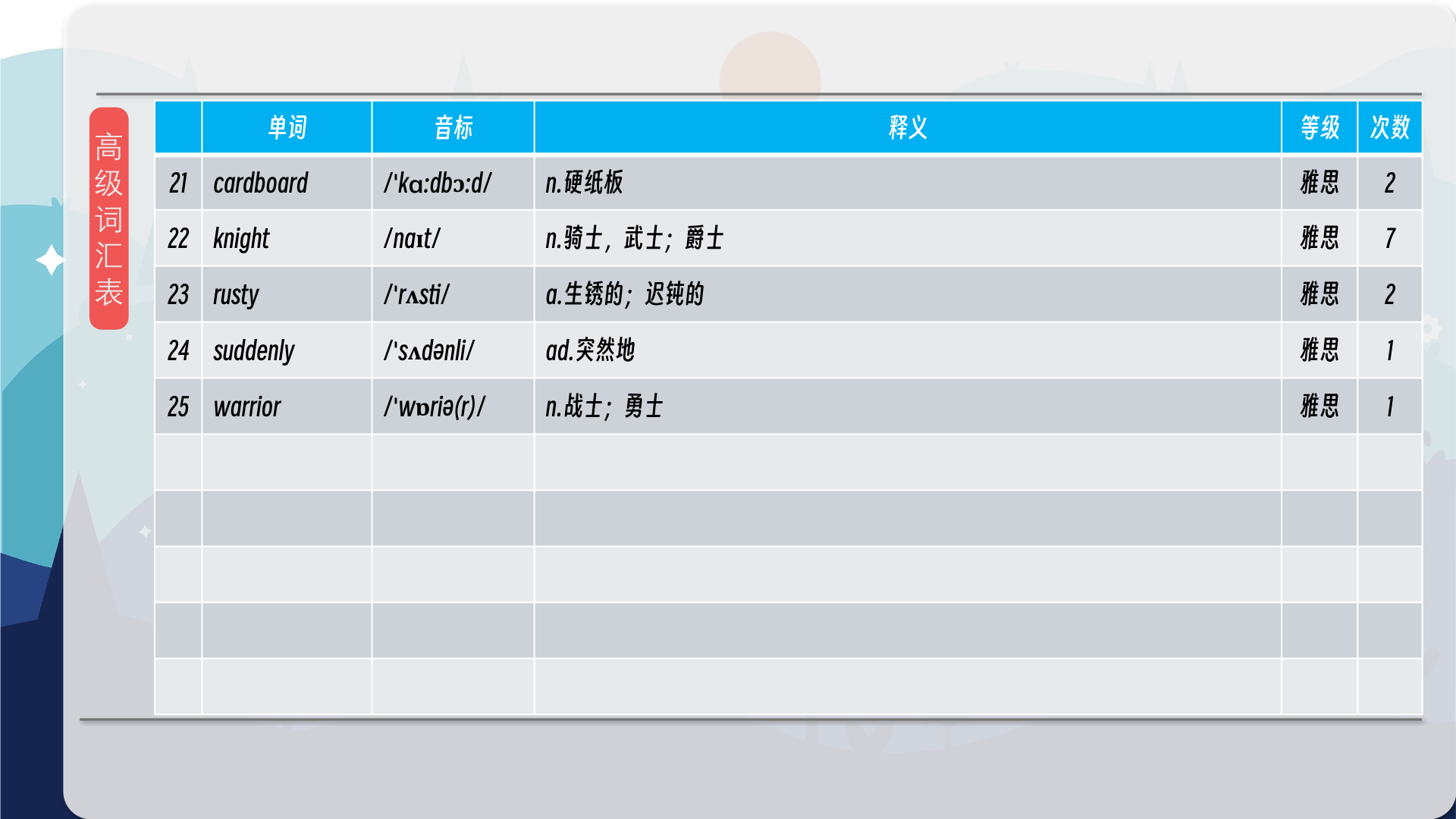

【核心词汇】
chivalry
polite behaviour usually by men towards women
骑士风度
男人对女人彬彬有礼的行为
His conduct during the crisis was an example of true chivalry.
他在危机中的行为是真正骑士风范的典范。
re-enactment
where you perform the actions of a past event
重演
表演过去事件的行为
The battle of Gettysburg re-enactment attracts thousands of visitors every year.
葛底斯堡战役的重演每年吸引成千上万的游客。
jousting
two people fight on horseback using a long pole or a lance to try to knock the other person off their horse
比武
两人骑在马背上,用长杆或长矛进行战斗,试图将对方击落马下
Jousting was a popular pastime for knights in medieval times.
在中世纪,比武是骑士们一种流行的消遣方式。
damsel (in distress)
young unmarried woman (in need of help)
(遇险的)少女
需要帮助的年轻未婚女子
The knight rushed to rescue the damsel in distress from the dragon’s lair.
骑士冲去将遇险的少女从龙穴中救了出来。
courtly love
an aristocratic code concerning the faithful love of a knight for his lady
宫廷之爱
一种关于骑士对其夫人的忠实爱情的贵族准则
The poems often explore themes of courtly love and idealized romance.
这些诗歌经常探讨宫廷之爱和理想化浪漫的主题。
aristocrats
people of high social rank
贵族
社会地位高的人
The aristocrats held vast estates and wielded considerable political influence.
贵族们拥有广阔的庄园并拥有相当大的政治影响力。
在公众号里输入6位数字,获取【对话音频、英文文本、中文翻译、核心词汇和高级词汇表】电子档,6位数字【暗号】在文章的最后一张图片,如【220728】,表示22年7月28日这一期。公众号没有的文章说明还没有制作相关资料。年度合集在B站【六分钟英语】工房获取,每年共计300+文档,感谢支持!